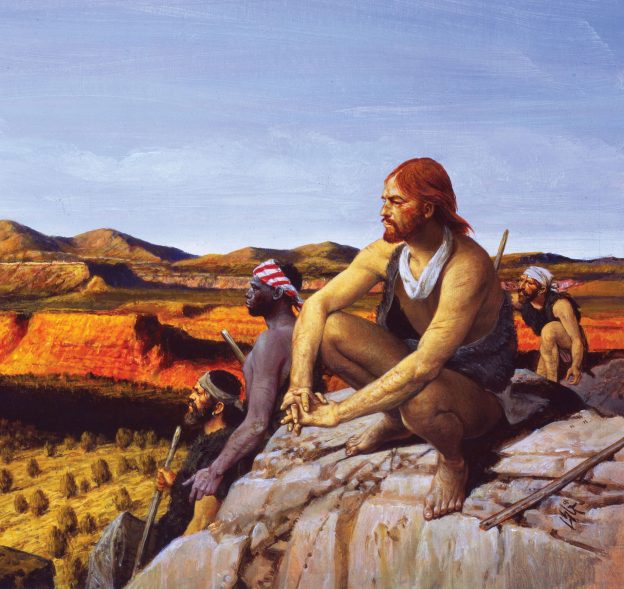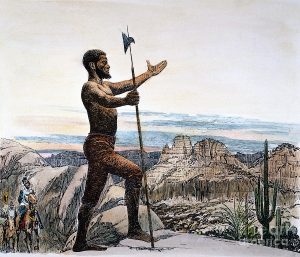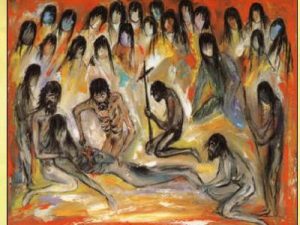Andre Resendes in “Following the Corn Trail,” describes Cabeza de Vaca, Castillo, Dorantes, and Estebenico’s journey across the continent and their interactions with the many native peoples they meet. The focus of Resendes’ narration is on the peaceful and now respectful if not revered interactions that now take place between the four survivors and the native populations. Resendes attributes this new reverence the natives show towards the group of survivors to their adopting this new “healer” persona. Resendes stating that, “As they travelled, the castaways continued to burnish their reputation as healers.” explains that Cabeza de Vaca and his party continued to call themselves healers as they interacted with various native communities. This is significant because the natives in turn accorded Resendes and his group great respect, and accompanied them safely on their journey, from one settlement to another, gifting them with offerings, and gathering food and supplies for them. Without this guidance and assistance, Cabeza de Vaca and his party might never have survived this journey.
Cabeza de Vaca leverages his surgical knowledge from Spain and Resendes makes reference to an account given when Cabeza healed a man who had been pierced by an arrow. Cabeza then made an incision, before removing the arrowhead and helping the man to recover. Acts like these earned his party great respect from all the native American tribes. Without this respect, they might have been assaulted or treated with hostility. The loyalty, attention and praise they garner as they seem to pray for people and treat illness earn them great respect and almost turn them into an incredible community shared and traded by many different native communities. The leaders of these native communities according to Resendes propagate tales of the feats and acts performed by Cabeza and his group and this only further spurns the groups notoriety and popularity. This is epitomised by the willingness of entire groups to forego food until it is offered and given by the four survivors now, “healers.”
Cabeza and his group are touted as healers, and “Children of the sun,” incarnations of divinity who give and take blessings at will. Through their advertised “power,” they create a new kind of raiding culture where one native community raids the next, as an offering before passing them on. This new raiding culture although exploiting the native people, enables Cabeza and his group to continue on their group, and so they act oblivious to it, and benefit by it. As the Indians began to fall ill, the explorers, now healers seemed to fall prey to their own deceptions, and began to believe they really could call upon the power of God. The Indians in a very real sense became enslaved to the four healers, in a way that seemed to fulfill life coming full circle.
Ultimately, it was this brandishing of their “healers,” title that enabled them safe passage in their travels, and although the action negligible in its morality, Cabeza de Vaca and the three other survivors manage to interact with the Indians amicably as a result of their commitment to this acquired title.




 Not only the Natives treated them like “son of the god”, the four “medicine men” also rewarded the Indian people and gained benefits mutually. According to Reséndez, once those four noble men received the presents from one tribe, they would give the rest to their followers.(193) The essence of the argument is that those four castaways are also grateful for the efforts those Indians spared and the kindness that Indians presented to the four. In addition, as the writer puts it, “other christians has already reached these remote lands and were casing so much harm to the natives”. Basically, Reséndez is implying that those four castaways developed the friendship with the natives and decided to help those Indians when they heard the Indians are brutally killed by the European conquistadors. This is a sign of the rationality overcoming the sensibility. It is true that the four castaways were indeed up in the air, however, instead of galloping to the Conquistadors, they took the Indians interest before the their sense of belonging to the Europeans. Additionally, from my perspective of view, the impulse of helping the Indians is due to their belief in God. The God’s will is rooted inside every angle of their life. Everything is under the supervision of the God. The four deserted people knew that it is a God’s will to testify if they could stand the test. It is their decision to choose whether they should lounge to the side of the Europeans or staying and helping by the Indian side. At last, they chose the later one.
Not only the Natives treated them like “son of the god”, the four “medicine men” also rewarded the Indian people and gained benefits mutually. According to Reséndez, once those four noble men received the presents from one tribe, they would give the rest to their followers.(193) The essence of the argument is that those four castaways are also grateful for the efforts those Indians spared and the kindness that Indians presented to the four. In addition, as the writer puts it, “other christians has already reached these remote lands and were casing so much harm to the natives”. Basically, Reséndez is implying that those four castaways developed the friendship with the natives and decided to help those Indians when they heard the Indians are brutally killed by the European conquistadors. This is a sign of the rationality overcoming the sensibility. It is true that the four castaways were indeed up in the air, however, instead of galloping to the Conquistadors, they took the Indians interest before the their sense of belonging to the Europeans. Additionally, from my perspective of view, the impulse of helping the Indians is due to their belief in God. The God’s will is rooted inside every angle of their life. Everything is under the supervision of the God. The four deserted people knew that it is a God’s will to testify if they could stand the test. It is their decision to choose whether they should lounge to the side of the Europeans or staying and helping by the Indian side. At last, they chose the later one.